Young Liberians are leaving their homes in droves to travel abroad. They are excited about the prospect of a scholarship outside Africa. They pay anything between $300 and $3000 to secure their scholarship slot. They travel by air or endure four days of road trip to come to Nigeria where they are told it would be easier to secure the scholarship from. However, they come to Nigeria and find out to their shock that they have been lured into a trafficking scheme. Who are the victims? Who trafficks them and what do they get in return? FIJ speaks with some of the victims who paid heavy prices to travel to Australia but wound up in Lagos.
Chris Cooper, a 23-year-old Liberian, struggled to form a smile on his lips. He looked tired, broken and stranded. He wore a navy blue mixed pattern shirt with touches of orange, wine and yellow feathers over dark blue pants. He had an ash-coloured hoodie with the inscription ‘new ball’ pulled over it.
On September 26, FIJ met him sitting within the premises of the Nigerian Legion, Igbe, Ikordou, Lagos. Dusk was falling but at a slow pace, however, it fell faster on his face.
He sat on one of the tyres used to form a demarcation in the compound and buried his face in his phone. He would only glance up at intervals to see who had entered the premises.
The few glances he stole revealed the worry lurking behind his eyes. They brimmed with the question, “Would I ever return home? Would I ever leave this place?”
Cooper had dry lips, stretched thin across his dry face. His facial bones stood out as he managed to smile. But then one could see how fake it was. When he got the courage to approach me, after hiding his hands in the front pockets of his hoodie and hanging around me for a couple of minutes, the first thing he said was, “I want to go home”.
The Liberian looked intently at me, as he tried to blink back the tiny tears welling up in his eyes. He arrived in May after he was tricked into believing he would be travelling to Australia for his undergraduate study by Phoebe Onogu, a Nigerian he had met on Facebook.
Cooper told FIJ that he believed everything Onogu had told him about the Australian scholarship because she had placed another Liberian whom he trusted as the middleman. He sighed and stared into the space in front of him for a few seconds.
“The Liberian she put at the fore of the scholarship was why I gained interest. He was the one relating with me and I trusted him because he is from my country,” he told FIJ.
“Even though he has betrayed me, I know he won’t do anything bad to me.”
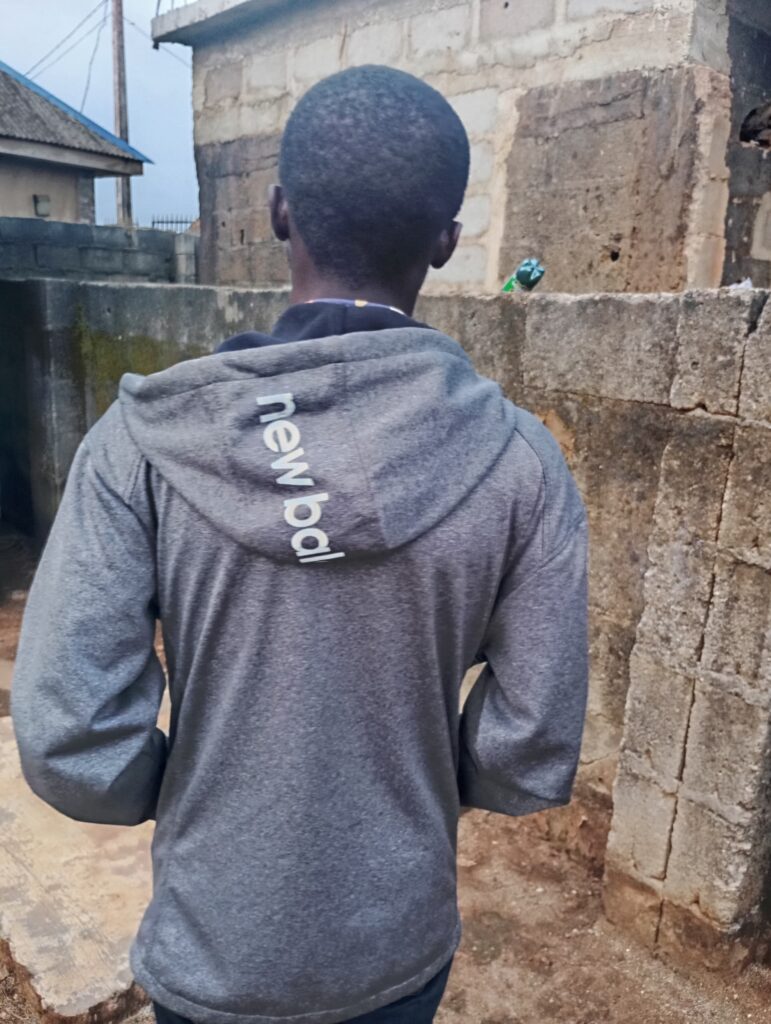
While Cooper believed his Liberian brother meant well for him, he was clear about Onogu’s intention towards him, only that it cost him $400, four days of road trip through Côte d’Ivoire, Ghana, Togo, the Republic of Benin before bringing him to Nigeria. But that was not all, it also cost him dashed Australian dreams.
“I came to Nigeria because I was told I could use it as a getaway to study in Australia. She asked me to send the money and then sent me fake admission to deceive me,” Cooper said.
But funding his Australian dream and Nigerian trip didn’t come easy either. Back home, the only black African country never colonised, he worked as a money changer, dealing with the Liberian and the United States dollars. He combined that with plumbing.
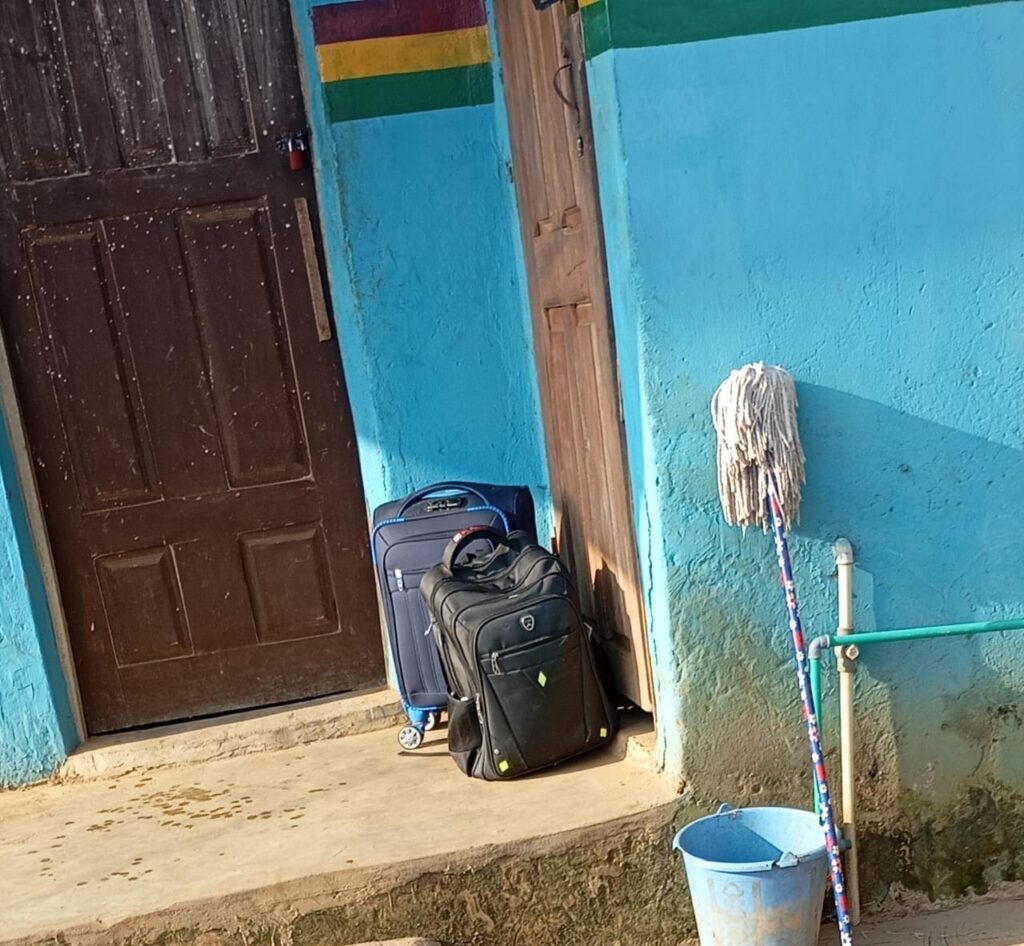
Cooper told FIJ he balanced his occupation with being a freshman in Public Administration at the University of Liberia College. “I had just gained admission into the University of Liberia College to study public administration but I was hopeful and wanted more,” he shared.
Despite the deception from Onogu and everyone who had schemed to swindle him of his money, Cooper still plans to school in Australia. He said, “If I go back to Liberia, I will try to see how I can leave the country again because I want to travel abroad.”
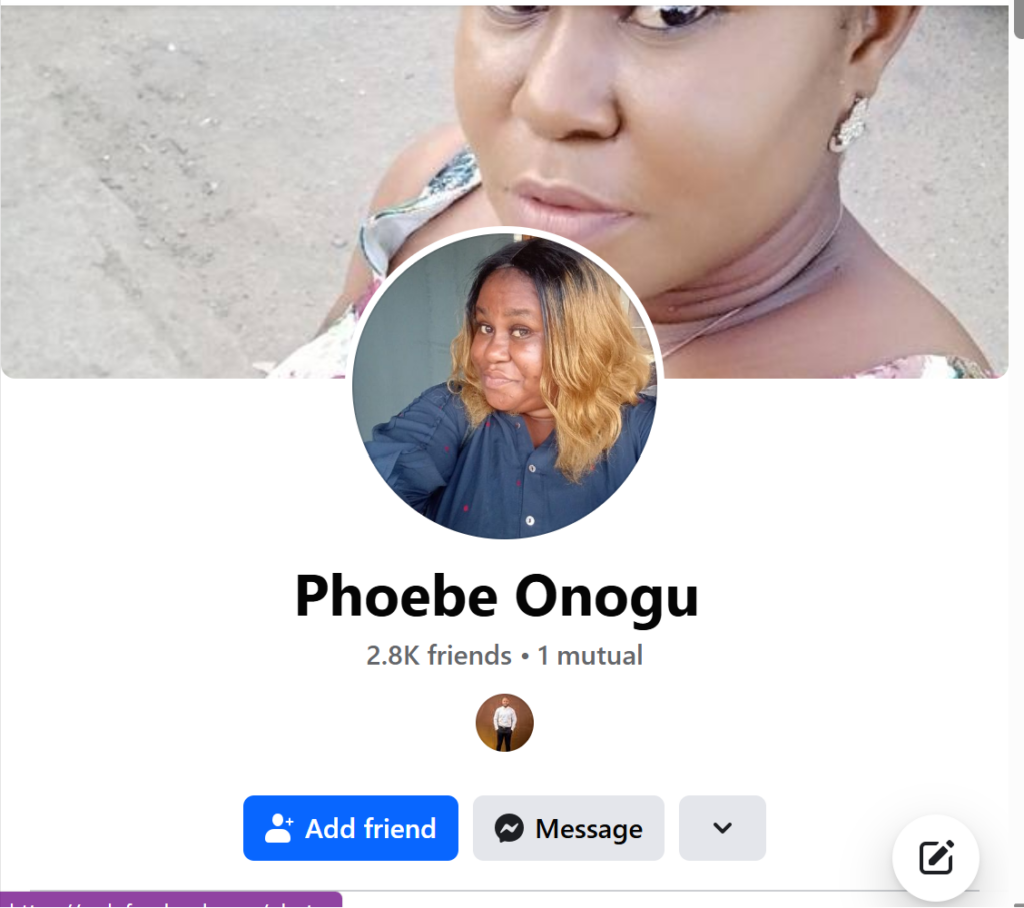
Cooper blames this decision on the rapidly falling standard of education across Africa: “I want to go to another country because everyone is leaving Africa to study elsewhere. The education here is not up to standard, especially in my country where you have to pay money for everything, and as a student where will you be getting the money from?”
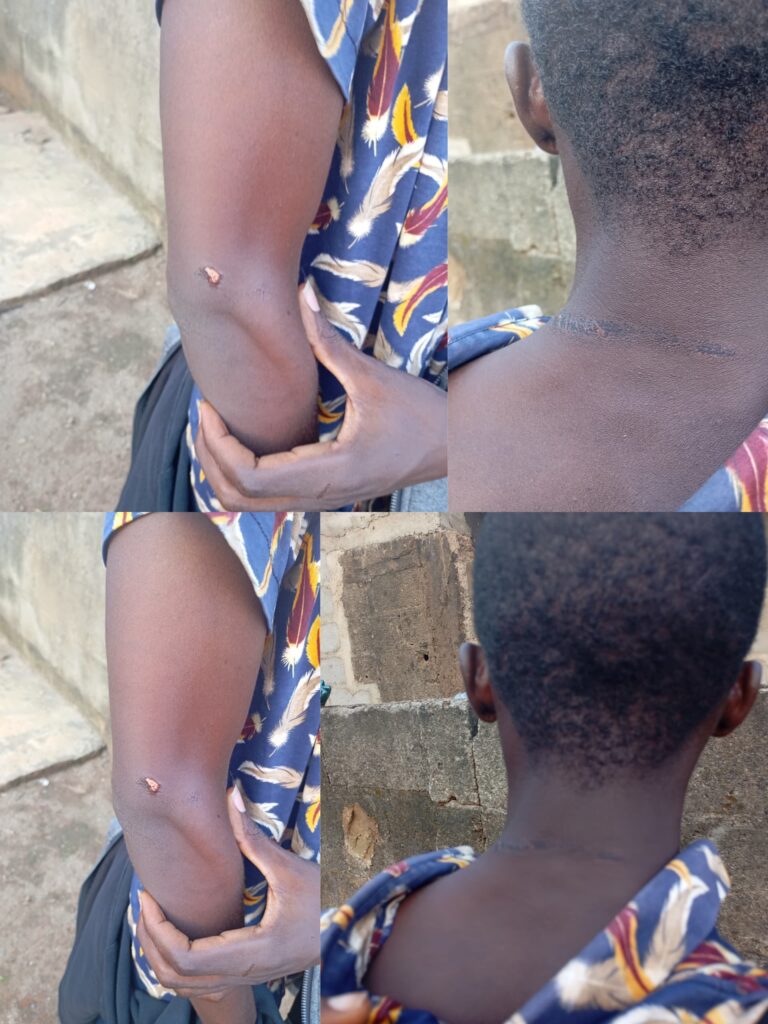
According to the United States’ Central Intelligence Agency (CIA), more citizens are migrating out of Liberian than entering it. It pegs the country’s net migration rate at -2.67 per 1,000 population. This implies that 2.67 people are leaving the country for every 1000 population.
The negative value also shows that more people are leaving rather than entering, which could lead to a population loss for the country through migration.
‘OUR BUSINESS IS QNET’ – SIDIJE
On the same day FIJ met Cooper, there was an invasion by the Provost Commander and the Public Relations Officer (PRO) of the Nigerian Immigration Service (NIS) Igbogbo, Ikorodu, two members of the Nigerian Legion, Prince Adeboye Adetu, a concerned member of the community and the publisher of the community media outlet – IgbeNews, into one of the residences at PZ Estate, Igbe, Igbo, Ikorodu, where victims who had been lured into Nigeria mainly from Côte d’Ivoire and Liberia were kept.
This building, painted brown inside out was built for residential purposes but has now been converted into an office. It has high walls with barbed wires. Inside the spacious compound, there was a scene of people being taught in an area that seemed to be designated as a car park.
The tutors, two of them, dressed in lemon shirts and black trousers, motivated their audience of about 30 people. Someone spoke English while the other translated into French.
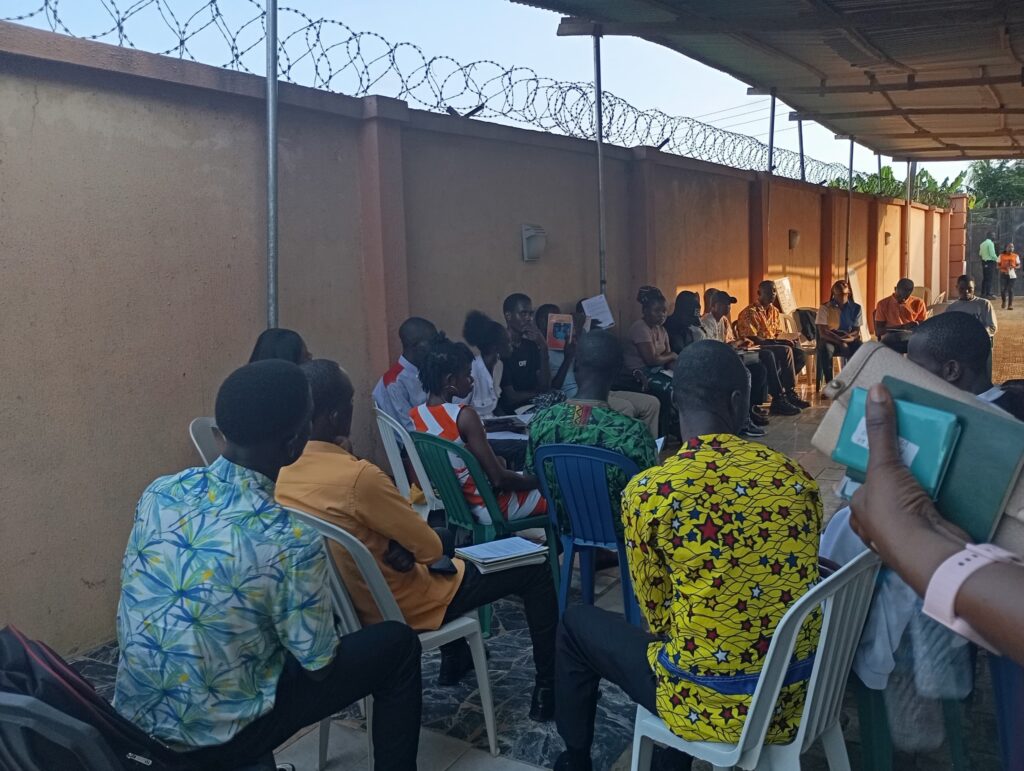
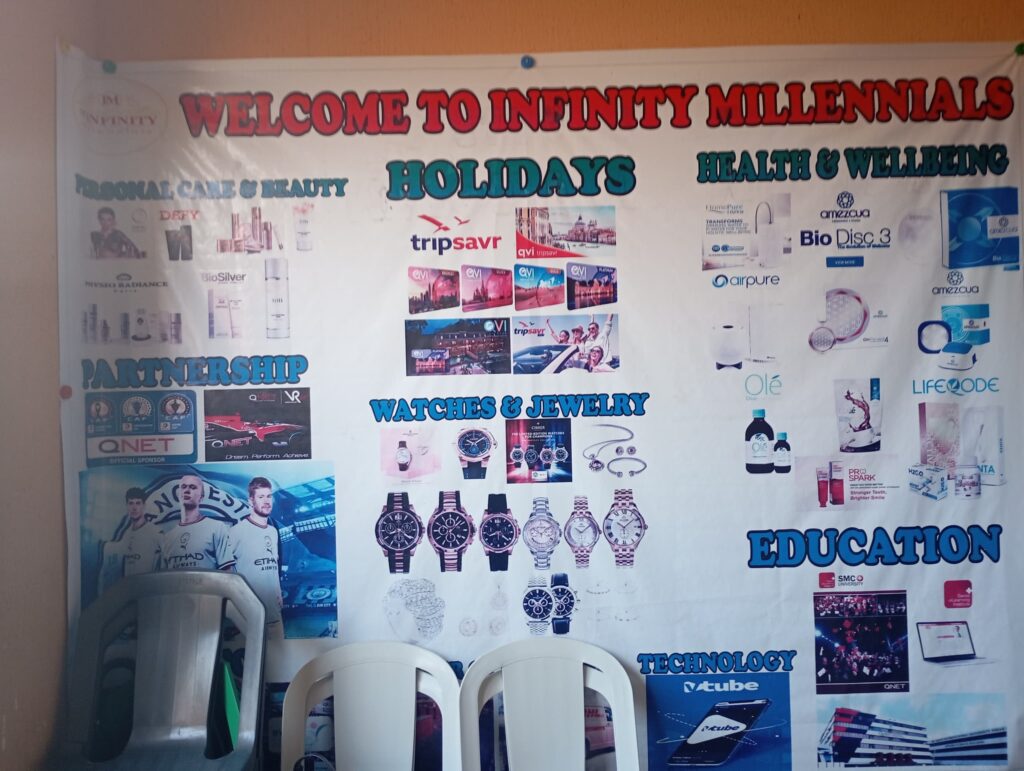
A bulk of their lessons, from the few minutes spent with them were, centred on how to grow a solid network and sell to them.
During a tour of the faculty called ‘office’, blue tiled floors led to rooms labelled for various purposes. Some of the rooms bore tags like ‘presentation rooms I and II’, ‘lecture room’, ‘interview room’ and so on.
An unnamed room served medical purposes. A Liberian nurse was in the process of injecting medication into one of the victims who was said to be ill.
She said she had practised as a nurse in her country but chose to relocate to Nigeria for network marketing.
Sory Sidjie, the leader of the trainees who is Ivorian said, “She is a nurse but she now works with us as a networker.”
Sidjie also denied being a trafficker to FIJ and the officials who questioned the activities of the group on the premises. He claimed to be a businessman who was involved in the marketing business.
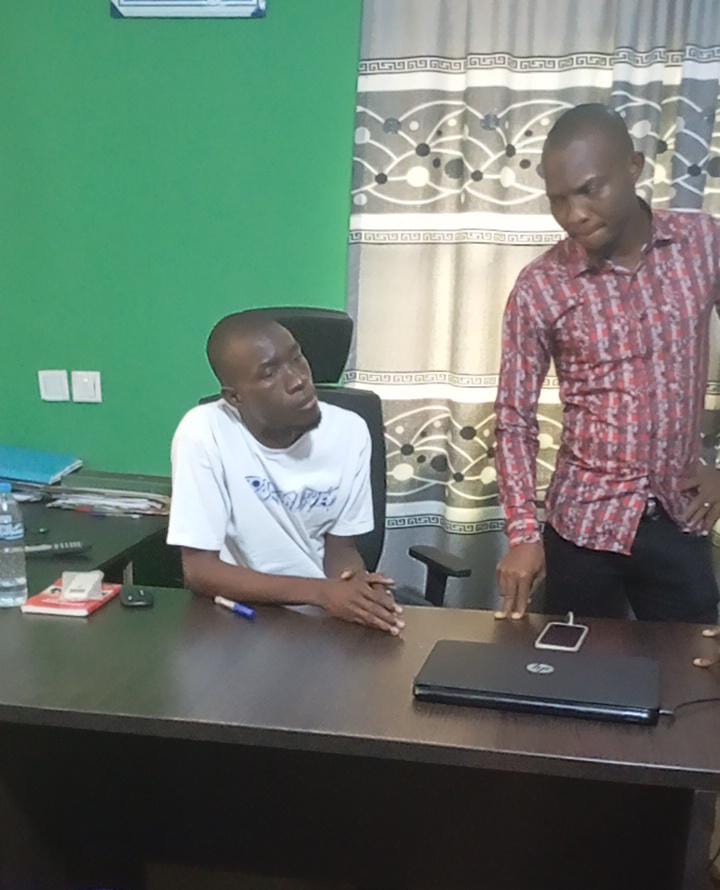
He said that when they lured people into Nigeria from other countries, they brought them into the country to also be engaged in the networking business.
“We are selling some hair products, toothpaste, perfume and jewellery. Some of the people here are the ones who call their relatives to join them in the business they do in Nigeria,” Sidjie said.
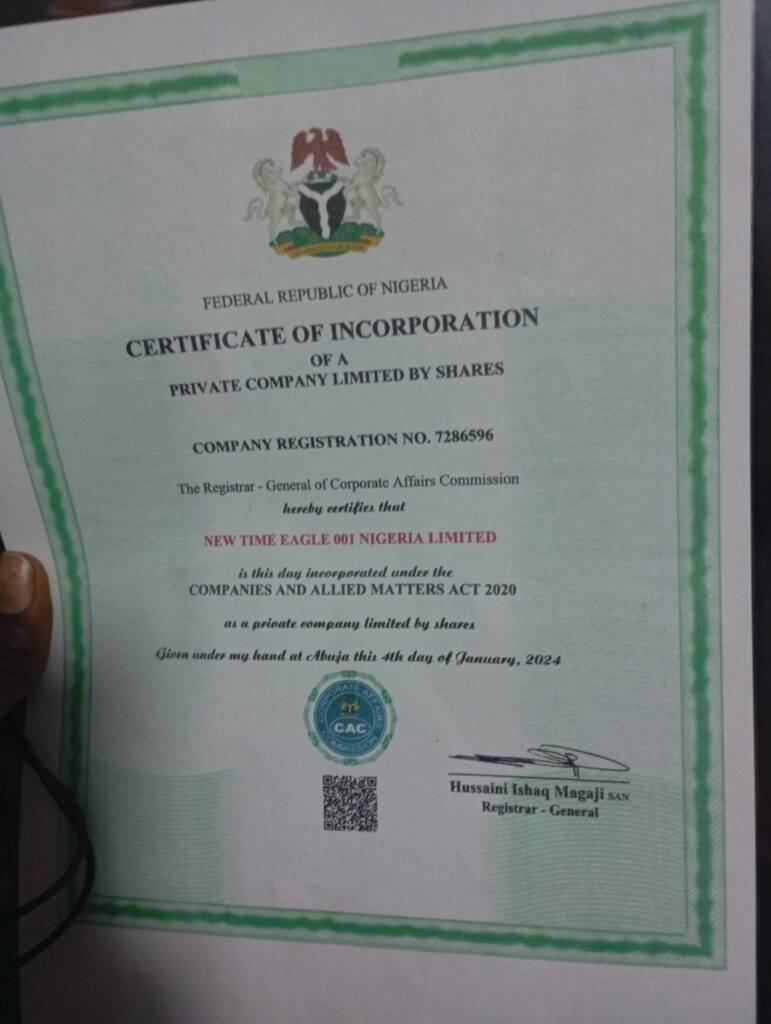
READ ALSO: From Nigeria to Burkina Faso: Undercover as a Trafficked Person
Sidjie and Issouf Ouattara, his vice, said their marketing business ‘New Time Eagle 001’ was affiliated with QNET, and their objective was to ensure that they have more money.
Speaking on how the victims are fed, he said, “Their feeding is that when they bring the money and their products are validated they will have money to feed themselves.”
He claims when recruits join their team, they give the recruits products which they have to sell.
At least two new team members join them every month, Sidjie claimed.
“If they agree to do the business after it was introduced to them, they can stay. However, if they don’t want to, they can always return home,” he said.
That was without their money, of course.
FIJ soon found that Sidjie was not lying, as intentional starvation was common to the traffickers who lured people from their home countries in the name of jobs and scholarships especially when they refused to scam more people.
LOVE AND DECEPTION
Masonia Bama, a 20-year-old Liberian, wore a long flowing gown with several beautiful patterns and different colours. When she met me on September 27. She had not eaten anything in two days.
She was deceived into Nigeria by Sugar, her cousin. She had lost so much weight and the bones of her face stood out. She had a mixture of anger and regret on her face. The anger was for allowing herself to be deceived by her cousin, the regret being the cause of Sampson, her 23-year-old boyfriend’s troubles.
After she arrived in Nigeria in February, it soon dawned on her that there was no scholarship and she wouldn’t be studying Medical Health but would have to hustle her way, which meant scamming other people into Nigeria, to survive.
“My sister called and said she wanted to help me get into Australia, but I had zero money on me. I told her I did not have the fare as I had only $100 at the time as the fare by road was $250 but she said she would add up the fare for me to bring me to Nigeria,” Bama told FIJ.
“So, before coming, she sent me to someone in Liberia. The mother of Thomas, another Liberian who had tricked her into Nigeria. I met the woman and she gave me money to travel down.
“I got to Nigeria and met Thomas, who brought me to the house and said my sister was in Australia where she was rounding off her exams and that when she finishes she would join me.
“Surprisingly, the next day, my sister whom they said was in Australia came to me and said she just returned from Australia and that I should follow her to process my visa. I did and they asked me questions about what I wanted to do, I reiterated that I wanted to go to school to study Medical Health.
“Later, she told me we would have to stay in Nigeria for three months before leaving for Australia but we would need to do some small business to sustain ourselves.
“She then said the business is that, the same way she told me she was in Australia, I would have to call someone and tell them the same thing. That I would have to deceive the person. Anyone at all that I can influence.”
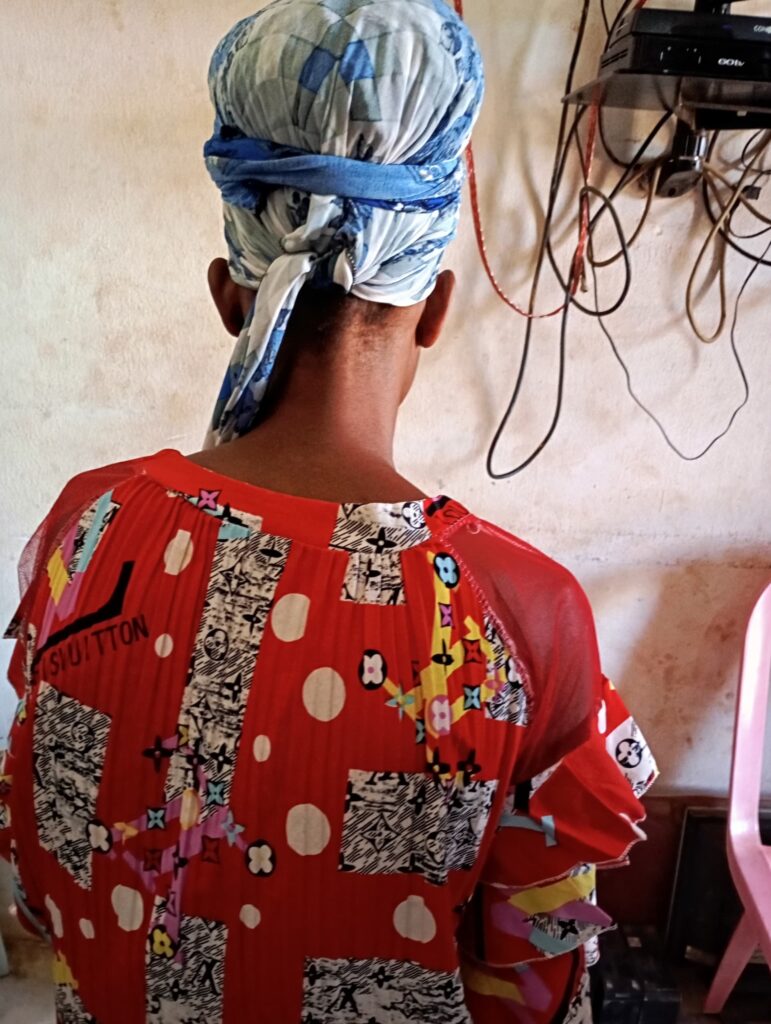
Bama, who now regrets her decision, said she managed to convince Sampson to meet her in Australia but he would also have to go through Nigeria. He bought a plane ticket and arrived in Nigeria on April 18.
She said Sugar told her to ask him to bring $1,500 which she told her was outrageous, but insisted that Sampson come with whatever he had which was $500.
After Sampson got to Nigeria, she said they would put pressure on his parents and relatives back in Liberia to send money or else they would deport their son. This worked and the family sent $400 to him to continue his trip to Australia.
When FIJ spoke with Sampson, he was broken. His eyes were red from the betrayal of the person he trusted the most, from hunger and then exhaustion.
Just like Cooper, he just wants to return home. He is badly hurt by the betrayal because he had a relatively stable job selling bikes in his country, but here he is stranded and has to depend on others to eat.
Since he and Bama refused to lie to others about being in Australia, the syndicate stopped giving them food and they’ve only been surviving miraculously.
Bama, who had just completed her secondary school education, said, “I just want to return to Liberia to work. I want to be in peace (sic). I feel very bad that I am here calling people and lying to them that I am in Australia. I feel so bad and disappointed.
“As for Sugar, she said this business is her life, and that’s on her.”
REACTIONS
An email FIJ sent to QNET on September 29, asking about their affiliation with New Time Eagle 001, as the owner mentioned their name, received no response at press time. Another message sent on Facebook has also not been responded to.
FIJ also sent WhatsApp and Facebook messages to Phoebe Onogu, who tricked Cooper down to Nigeria, on September 29 but there was no response from her.
When FIJ called Onogu’s phone for a response on October 4, she asked that FIJ speak with Cooper.
“You have Chris’ number, right? Go talk to Chris. He has given you people information. Go ahead and talk to him,” she told FIJ.
FIJ also tried to contact Sugar via Facebook as efforts to get her phone number were futile. She has yet to respond to a message sent to her via the platform on September 30.
On September 29, FIJ called Peter Osuman, the Liberian Ambassador to Nigeria. He said the embassy was aware of the case and area in Ikorodu and was investigating.
However, he said some of the young Liberians were indeed trafficked into the country through deception but a number of them have insisted they would remain in Nigeria.
He said they couldn’t be compelled to leave or be deported out of Nigeria because they were in one of the territories that formed the Economic Community of West Africa (ECOWAS).
“The embassy is aware of the case. We are fully aware. I have visited the place they called office. I went there with tactical officers and 20 armed officers,” he told FIJ.
“I met with the lady in charge, a Liberian who also works with Cameroonians and Ivorians. I asked them why they were deceiving people to pay $4,000 only to dupe them.
“We arrested the main lady, Arbetha Grace and took her and four others to Ikeja. For the victims, the people who wanted to return to their countries, we helped them
“But those who insisted on remaining in Nigeria, we left them. Anyone willing to go back to Liberia should put it on paper and bring it before the embassy. We have a flight to take them back home, just the ticket.
“This is an ECOWAS territory and no one has the right to force them out of there. We were also surprised to learn that the police released Grace after two days.”
FIJ’s TRAFFICKING COVERAGE
Since the beginning of 2024, FIJ has documented stories of Nigerians being tricked into other African countries. This includes an undercover investigation by FIJ founder ‘Fisayo Soyombo.
Between December 18 and 23, Soyombo travelled to Bobo Dioulasso in Burkina Faso to expose how Nigerians were trafficked into the country on the premise of a high-paying dollar job.
He discovered the syndicate and caught their faces on camera. He detailed how their victims were lured into submitting lists of contacts who could also be manipulated into the scheme; a networking scheme where a scammed victim can only be free after bringing people to replace himself. Soyombo spent two weeks in the country, spent over N2 million but returned with no job and no money.
FIJ also published on August 15 how Olubunmi Fadogba, a security guard, currently in detention in Benin Republic, lost his wife, money and car after being lured into the country by QNET scammers.
He relocated to Benin Republic, leaving his wife, daughter and job behind, with the hopes of resuming a new role as the Chief Security Officer in a company he didn’t know was non-existent.
Another trafficking report, published by FIJ on September 10, revealed how Femi Ayoola, a former medical laboratory scientist, was tricked out of Nigeria by a former friend.
Ayoola was told he had a job offer waiting in France but he would have to train in Senegal before then. However, on his way to Senegal, he was told to stop over at Burkina Faso.
He ended up spending four months in Burkina Faso, which was the traffickers’s plan for him all along. He escaped the country looking emaciated but his money and dreams were gone.

